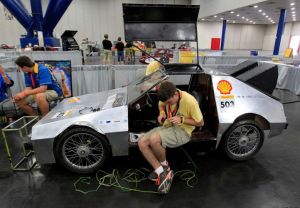
The Shell Eco-Marathon was held in Houston again this year. According to John Carambat, moderator of the club, the St. Paul’s Eco Car team entered four cars in this year’s race. Of the four cars, two cars made it to the six mile run (ten laps). Competing against high school and collegiate teams from across the country, the SPS team placed fourth in Bio Diesel with 96.4 miles per gallon.
The first place vehicle in the Bio Diesel category got 470 mpg. How many miles per gallon your vehicle gets can play a huge role in how well you do in the competition. According to Carambat, to get high miles per gallon, the car has to be light weight (less than 450 lbs.), have low rolling resistance, good narrow tires pumped up really hard, have bearings with no friction. After that, it’s just any sort of efficiency with terms of tuning the engine.
The drivers also play a big role into how many mpg the vehicle can get. The drivers do something called hyper-mileing, during which they drive at certain speed and kill the engine and roll until the speed decelerates to about 12 mph. The driver then starts the engine back up and brings it to about 18 or 19 mph and kills the engine again. Depending on how well they do this, it can double or even triple the vehicle’s mpg.

The St. Paul’s team is now in its third year, and has grown every year.
“I saw Marcus Garner who did Eco Car in 8th grade, and he seemed to have a lot of fun with it,” sophomore team member Cray Pennison said. “I was really impressed with the set up at the assembly at the end of my 8th grade year, so I decided to join during my Freshman year.”
Students interested in joining the club next year are encouraged to listen to the announcements and put his name on the list to apply. According to Carambat, they will accept fewer members next year because the size of the team continues to increase, and they do not have enough supervisors.
The team works on the cars Mondays and Wednesdays for two hours each, and will occasionally put in a five-hour work day on a weekend (with about an hour lunch break).
“We really don’t put in a lot of hours if you compare us to the band, football, or any other sport,” Carambat said. “We probably put in about half the time compared to any other sport.”
According to Carambat, they are participating in an electrothon next year. In an electrothon, you build bigger and stronger cars that go a lot faster at about 55 mph for about an hour. They have one competition in Florida during February and May and another in May in Oklahoma. They have one team dedicated to building a car for the electrothon.
To view a video of this year’s Shell Eco-Marathon competition that features some of the St. Paul’s team members, click the image below.
(video courtesy Shell Oil Company)


[…] life. Extracurricularly, Addison was affiliated with Students Hosts, Lasallian Youth Leaders, Shell Eco-Car Club, and several other organizations. Aside from his involvement in competitive cycling, Addison wrote […]
LikeLike
[…] life. Extracurricularly, Addison was affiliated with Students Hosts, Lasallian Youth Leaders, Shell Eco-Car Club, and several other organizations. Aside from his involvement in competitive cycling, Addison wrote […]
LikeLike